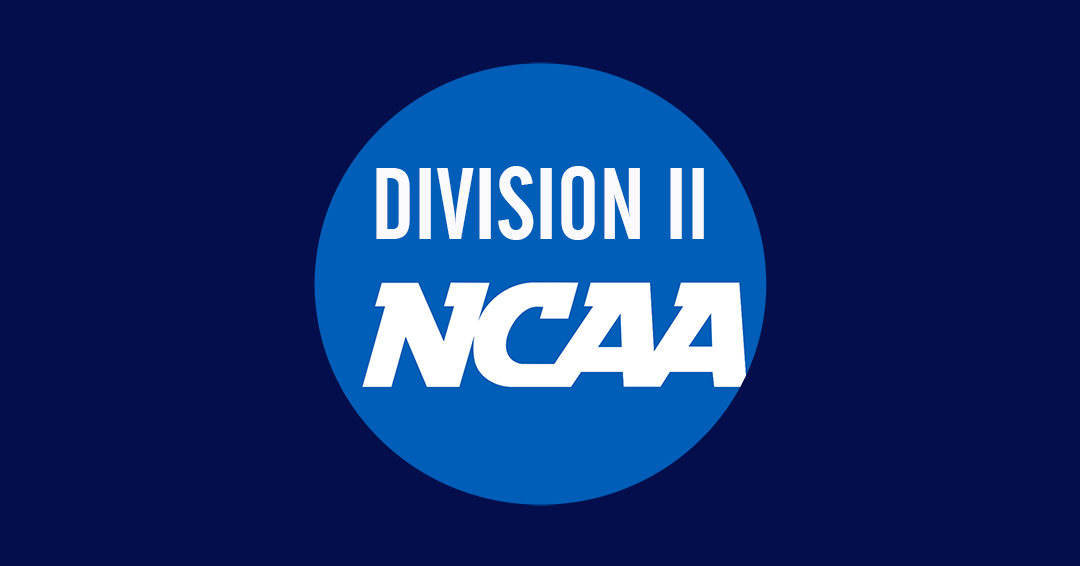INDIANAPOLIS, Ind. — Delegates approved several legislative proposals at the Division II business session of the 2022 National Collegiate Athletic Association (NCAA) Convention in Indianapolis.
The legislation impacts areas such as four-year college transfers, the division’s legislative options and its infractions process. Additionally, one measure establishes a day every year dedicated to civic engagement activities, on which countable athletically related activities such as games and practices will be prohibited.
Transfers
The division’s delegates adopted legislation that impacts several areas related to four-year college transfers. The legislation, supported by more than 80% of the delegates, is effective immediately for student-athletes transferring for the 2022-23 academic year. It includes the following changes:
- Requires undergraduate student-athletes to complete an educational module related to transferring before the school may enter the student-athlete’s information into the NCAA Transfer Portal.
- Eliminates the previous school’s ability to object to the use of the one-time transfer exception.
- Requires the head coach of the certifying school and the student-athlete to certify in writing that no athletics staff member or other representative of the school’s athletics interest contacted the student-athlete or any individual associated with the student-athlete (e.g., family member, scholastic or non-scholastic coach, advisor), directly or indirectly, without first obtaining authorization through the notification of transfer process.
- Establishes June 15 as the date by which a student-athlete must provide written notification of transfer to the school to use the one-time transfer exception (not applicable to midyear transfers).
- Permits schools to reduce or cancel an athletics aid agreement previously signed for the next academic year if a student-athlete requests to be entered into the Transfer Portal. It would remain impermissible to reduce or cancel a student-athlete’s athletics aid during the academic year in which the student-athlete provides notification.
“With Division II having the most restrictive transfer rule, the Division II Presidents Council believes that this proposed change would be extremely beneficial for student-athletes and institutions alike,” Sandra Woodley, president at Texas Permian Basin, said during the business session. “The goal of the proposal is to address student-athlete well-being and institutional enrollment management, and we believe this proposal achieves both.”
Mackenzie O’Neill, a Division II Student-Athlete Advisory Committee member and former soccer player at Missouri Western State, also supported the change.
“This proposal would provide balance between institutional and student-athlete needs surrounding the transfer process,” O’Neill said. “By enhancing student-athlete understanding through an educational module and eliminating the ability of the previous institution to object to the student-athlete’s use of the one-time transfer exception, this proposal would make the transfer process more student-athlete-friendly, while still ensuring that student-athletes have the necessary resources to make informed decisions about the transfer process.”
Civic engagement day
By a 144-137 vote, Division II delegates narrowly adopted a proposal crafted by the Division II Student-Athlete Advisory Committee that prohibits countable athletically related activities, such as practices and games, on the Tuesday after the first Monday in November every year. The legislation’s intent is to provide more opportunities for student-athletes to participate in civic engagement activities like voting and volunteering. This change is similar to legislation passed in Division I in 2020.
Opposition voiced to the proposal included concerns around potential scheduling conflicts for student-athletes in fall sports, including conference tournaments. Division II SAAC and Management Council representatives spoke in support of the proposal.
“This proposal allows student-athletes to perform their civic duties, such as voting, volunteering and community engagement. It’s important to emphasize that this full day allowed for civic engagement goes beyond just having time to vote. In addition, student-athletes will be able to amplify their voice at congressional, local and state elections, and have time to give back to the community through engagement activities,” said Kate Pigsley, a former field hockey player at Southern New Hampshire and member of Division II SAAC. “This proposal supports Division II SAAC’s ‘Total Package Student-Athlete’ goal by encouraging student-athletes to be well rounded and exercise their right to vote, educate and immerse themselves in their communities with civic engagement.”
Marty Gilbert, a member of the Division II Management Council and faculty athletics representative at Mars Hill, echoed Pigsley’s comments.
“In addition to having focused time to vote on presidential and some congressional, state and local elections, student-athletes will also have more opportunities to volunteer and participate in community engagement activities,” he said. “Since this proposal impacts all institutions and student-athletes in the same way, there won’t be any competitive inequity, since, regardless of the sport season, a student-athlete will be required to take the day off.”
Other legislation adopted
The Division II delegates also passed four other proposals:
- Establishing a negotiated resolution path, effective immediately, in the Division II infractions process, similar to that used in Division I. To use this path, the enforcement staff, school and involved individuals must agree on the violations, the level of violations and penalties. The Division II Committee on Infractions must then review and approve the resolution agreement.
- Broadening the division’s legislative options in three areas: emergency legislation, resolutions and special conventions, effective immediately.
- Permitting student-athletes to use a maximum of six credit hours earned during a summer term toward a voluntary or optional minor to meet progress-toward-degree requirements, effective immediately.
- Eliminating the option for a prospective or current student-athlete to sign a written release or waiver declining the sickle cell solubility test, effective August 1.
Information courtesy National Collegiate Athletic Association (NCAA)




